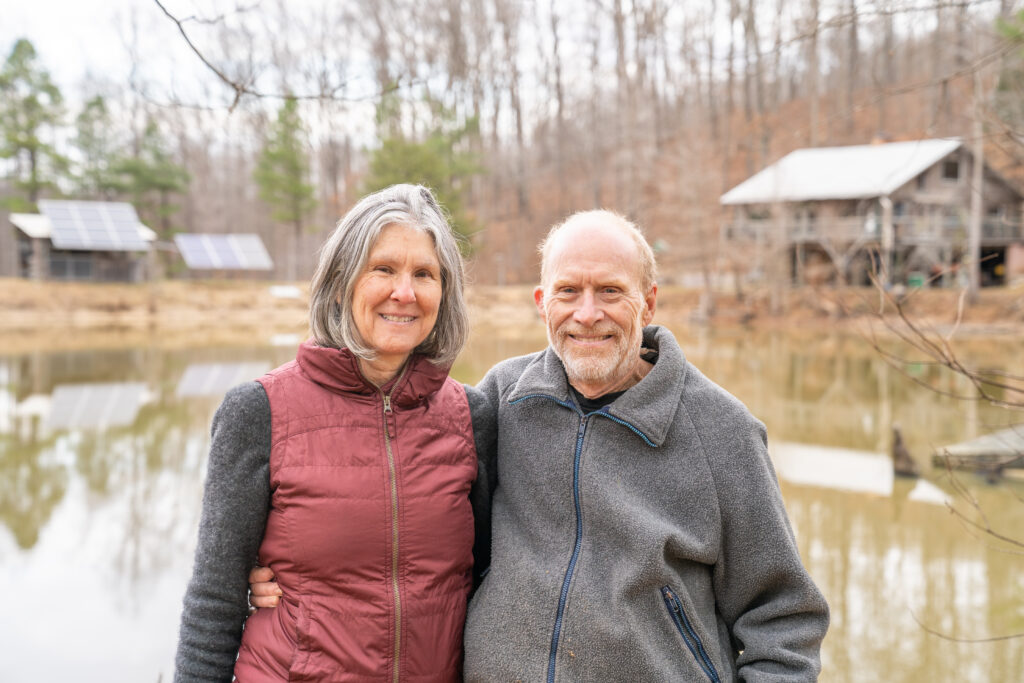By Amanda Flinn
This story was first published in the January 2023 issue of “The Best Years” with the title “Living Sustainably: Jim and Mary Maginel steward the land.”
For many, sustainable farming is a pipe dream, or a fancy idea on the internet, but for Jim and Mary Maginel of Cape Girardeau, it is a way of life. Throughout the past 35 years, they have worked to cultivate 120 acres of farmland in Southern Illinois using methods practiced by their ancestors in the early 1900s, long before heavy equipment and chemical fertilizers came onto the agriculture scene.
Together, they set out to answer the question: How do you live in harmony with the natural resources you are responsible for stewarding?
Through trial, error and continuous education, the Maginels discovered the answer lies in observation of the land, because without it, you aren’t fully aware of what your resource has to offer. Looking back, both Jim and Mary admit, they didn’t always know what they were doing.
“We came on the property thinking we knew what was best,” Jim says, remembering their experience with walnut trees. “You can’t force trees to grow in a field they aren’t interested in. It doesn’t have the same kind of results. That was a hard lesson learned.”
Purchasing land from his parents’ cattle farm in the mid-1980s, the Maginels began planning a redevelopment of the property. They were concerned about soil erosion from the cattle, and the land was covered in non-native fescue. One of their first steps in the transition to sustainable farming was establishing native plants and grasses, a process that took two to three years.
During this time, they built a farmhouse on the property using repurposed materials from old barns and sheds. Raising two children, they lived in Cape Girardeau and worked weekends at the farm. Through the years, they added a rainwater collection system and solar panels for a completely off-grid experience. By the time the house was complete, their children were grown. The Maginels became full-time residents on the farm in 2007.
Wanting to develop space for growing their own food, they began experimenting with old and new methods of farming, while paying attention to the land. They knew taking care of the soil was important, so if heavy rains came and washed out a section, they piled leaves in those areas to protect the soil. If animals were making trails on the land, they redirected their route by placing barriers in their path. The food they grew was shared with the livestock. The livestock, in turn, provided the fertilizer to keep the soil replenished. The whole system was set up to operate in support of each element.
Permaculture mimics the principles that naturally occur in nature and is part of the sustainable farming practice. Wanting to honor this system, the Maginels foraged wild blackberries, elderberries and spice bushes. They learned to plant crops in locations where they would thrive. Trees were planted because their livestock was happier with shade in the pasture. But those same trees produced berries, edible acorns or persimmons, causing the goats and sheep to race toward the harvest each morning. Very little was ever wasted.
Any produce that couldn’t be consumed by the Maginels or the livestock was traded or bartered for other services.
“We had milk goats that we used for cheese, yogurt and goat milk ice cream. But we didn’t want a billy goat on the property,” Mary says. “So, we would exchange blueberries for stud services.”
It was beneficial for everyone involved.
After visiting their kids at college, they discovered the art of raising oyster and shiitake mushrooms by inoculating logs from an oak tree. They were able to teach others through in-person workshops, showcasing their successes as well as their mistakes.
For the Maginels, the goal has never been profit, but rather, education.
As part of the Southern Illinois farming network, they connected with other like-minded individuals and groups, welcoming students from Prodigy Leadership Academy, Cape Central High School and Southeast Missouri State University to teach about sustainable practices in agriculture and farming.
It’s a slower way of life, but one that “tunes you into the natural world,” Jim says.
On cloudy days, Mary says, it’s difficult to do laundry, because it requires energy from the sun. In the winter, when the water freezes, the ice has to be broken up for the animals to drink. Growing, drying and cooking beans over a wood stove takes time.
So when Jim was diagnosed with multiple myeloma in 2018, the Maginels made the decision to move back to the city. Even though they no longer live off-grid, they still visit regularly, and many of their sustainable farming methods have carried over to their new city life. They still grow a variety of their own food, enjoy supporting the local farmer’s market and continue to learn from their two grown children who are both involved in careers that support stewardship of the land.
Eventually, the Maginels hope to transition the farm to someone with similar ethical values and ideas. But for now, they will keep doing their part — not only for themselves, but for the benefit of generations to come.
Want to Help?
Small changes make a big difference; it’s never too late to start. If you want to make a positive impact but don’t know where to begin, try these simple tips at home:
1. Protect the soil. In winter, collect mulched leaves and place them around the base of your trees. In summer, leave your grass clippings on the lawn.
2. Compost your garbage. Up to 2/3 of trash can be composted, which reduces the amount that ends up in landfills. Common items that can be composted include coffee grinds, vegetable scraps, eggs and more.
3. Plant native. Choose perennials when you can. Native plants support a functioning ecosystem and provide food for pollinators.
4. Grow something. There’s satisfaction in harvesting food your family can enjoy. You don’t need to plant a whole garden. Start small with parsley, or grow tomatoes for a salad.
5. Support local. Visit the farmer’s market and connect with people in your community. You’ll not only get great-tasting food, but you’ll also receive the opportunity to support the local economy and benefit the environment.


